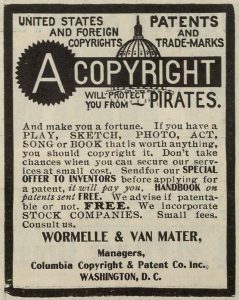 Digital collections have the exciting ability to shed light upon and provide accessibility to materials that had previously been hidden within locked rooms in the library building. By digitizing and sharing material online, libraries can facilitate advancements in research that were hindered by geography and funding. Digitization creates a copy, however, and a lot of the material held in libraries and archives are protected by copyright and other intellectual property laws. Evaluating the copyright status of material has become part of a library’s normal digitization process, but not all digitized collections have clear-cut ownership histories.
Digital collections have the exciting ability to shed light upon and provide accessibility to materials that had previously been hidden within locked rooms in the library building. By digitizing and sharing material online, libraries can facilitate advancements in research that were hindered by geography and funding. Digitization creates a copy, however, and a lot of the material held in libraries and archives are protected by copyright and other intellectual property laws. Evaluating the copyright status of material has become part of a library’s normal digitization process, but not all digitized collections have clear-cut ownership histories.
Many materials may have been ingested by the archive in a disorganized and bulk donation, making the rights and ownership status of individual materials difficult to put together. A library may also have misplaced donation paperwork, or had been using older donation paperwork that did not address the ownership of the intellectual property over the ownership of the copies left in the care of the library. In addition, unexpected issues can arise with a collection even with careful custodianship and thorough record keeping. Here are three interesting stories circling the periphery of digital libraries, copyright, and ownership.
A History of Slavery
A series of daguerreotypes in Harvard’s archives, that have been added to Harvard’s digital collections (https://library.harvard.edu/digital-collections) are currently the topic of a lawsuit that has come under some discussion amid intellectual property professionals. The daguerreotypes are of five enslaved individuals, photographed in 1850 to support the research of a Harvard professor. Though not completely an intellectual property lawsuit, the plaintiff, Ms. Tamara Lanier makes the case that participation in the photographs was not voluntary, and that ownership of daguerreotypes should fall to the decedents of the enslaved individuals.
Hartocollis, Anemona (2019) Who should own photos of slaves? The decedents, not Harvard, a lawsuit says. New York Times. March 20. https://www.nytimes.com/2019/03/20/us/slave-photographs-harvard.html
Research Turned Evidence
While not a new case, and not of a digitized collection, the collection of oral histories from IRA members commissioned by Boston College in 2000 hold some important implications for the care and treatment of oral histories in digital collections. It was through the publication of Ed Moloney’s Voices From the Grave: Two Men’s War in Ireland that the content of the oral history collection came to light. Based on information in the book, and hinted at by the book, the oral histories, kept under extremely restricted access at Boston College libraries, was subpoenaed for help in a murder investigation.
Digitization of oral histories can similarly bring to light possibly controversial studies conducted by researchers in the past, as well as sensitive material shared by their interviewees. Oral histories have not frequently fallen under oversight by Institutional Review Boards, but incidents like the one at Boston College lead some universities to reconsider this process. Scholars are encouraged to be mindful of the risks and challenges in conducting oral histories; digital libraries must consider these same risks in digitizing them and making them available online.
McMurtrie, Beth (2014) Secrets from Belfast: how Boston College’s oral history of the Troubles fell victim to an international murder investigation. The Chronicle of Higher Education. January 26. https://www.chronicle.com/interactives/Belfast
Libraries Versus Authors
On the surface, the relationship between authors and libraries in the U.S. is a comfortable one, but it has historically been laced with drama. In 2018-19 the drama escalated when the Internet Archive partnered with several libraries in California to ‘lend’ digitized copies of library books. A white paper on controlled digital lending of library books supports the Internet Archive’s Open Library initiative (https://openlibrary.org/). The white paper explains a method where libraries can digitally lend books in their collections without infringing on copyright law. The fair use argument proposed has been viewed as radical, and several author’s groups have taken issue with the program, calling it outright piracy.
Anderson, P. (2019) Authors Guild and Society of Authors Allege Copyright Infringement by the Internet Archive. Publishing Perspectives. January. https://publishingperspectives.com/2019/01/copyright-battle-internet-archives-open-library-authors-guild-society-of-authors/
Hansen, D. R. & Courtney, K. K. (2018) A White Paper on Controlled Digital Lending of Library Books. https://controlleddigitallending.org/whitepaper
National Writers Union (2019) Appeal from the victims of Controlled Digital Lending (CDL). https://nwu.org/book-division/cdl/appeal/